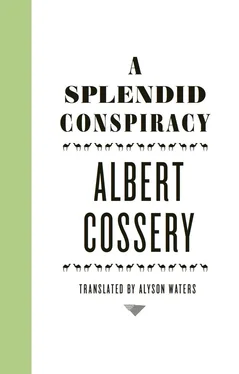“I know you’re trying to help me, and I thank you for your concern.”
“My concern,” said Imtaz, “is in direct relation to my feelings of friendship for you. From now on you are part of the love and joy that governs our existence in this city. We would be in despair if we were to lose you.”
“I am deeply touched. But I am afraid I won’t be able to contribute much to your goal.”
“And I am sure of the opposite. You’ll see. Stop cursing this city; it has surprises in store for you.”
“The first and most wondrous is your friendship! It’s making me believe in other surprises.”
“Come,” said Imtaz, “I must get dressed now. I want to take you to Chawki’s tonight. You’ve got to meet that man.”
“That bastard!” Teymour protested.
“Bastards are the salt of the earth,” Imtaz replied. “And Chawki is a genius of a bastard. Let us not deny this bunch the opportunity to entertain us.”
Imtaz disappeared into his bedroom and came out ten minutes later dressed, as always, with discretion and elegance. He resembled one of those refined portraits of him that had appeared in theater magazines at the time of his notoriety. Walking toward Teymour, he held out to him an old gold pocketwatch, its delicately carved case inlaid with rubies, and said simply:
“Allow me to offer you this gift in friendship.”
Teymour took the watch and looked at it with increasing wonder.
“It’s much too valuable,” he stammered. “I cannot accept it.”
“Its value is mostly sentimental and that’s why I’d like you to have it. It belonged to my deceased father. I’d like you to be his heir, just as I am. Aren’t you my brother?”
“I don’t know what to say,” Teymour replied humbly.
“Don’t say anything. Accept it, and you will make me happy. Come on, let’s go now.”
Trembling with emotion, Teymour slid the watch into his vest pocket, stared at Imtaz in silence, nodded as a sign that he had understood and then headed decisively toward the apartment door.
It was obvious that the city’s residents had no intention of increasing the prestige of the evil sorcerer responsible for the disappearance of several prominent citizens by playing into his hands with nighttime strolls. As soon as dusk set in, they deserted the badly lit streets to shut themselves in at home and take stock, in the calm and security provided by locked doors, of the disasters occurring outside. The fact that until now all the victims had been rich did nothing to allay the fears of the poor. There was nothing to prove that, in the dim shadows, the infamous abductor had the ability to discern an individual’s economic status before attacking him. Only the shopkeepers — a notoriously greedy race — dared leave their doors open during these nerve-racking hours; they felt that their merchandise provided them with a protective shield. From time to time one could see the smoking torches of a few street peddlers sleepily pushing their carts in anticipation of potential customers. The fleeting outline of the occasional passerby, either a reveler or a beggar, sometimes appeared, crossing the bleached zone of a streetlamp. In this lugubrious atmosphere, Teymour fell prey to wild thoughts. The mystery that hung over the city, these houses with their closed shutters, these soundless streets, these thick black clouds sweeping across the night sky all made him feel as if he were on the threshold of a strange and incomparable adventure. His companion’s presence encouraged his phantasmagoric tendencies: Imtaz was advancing at Teymour’s side holding him firmly by the arm; he seemed to communicate through this contact the warmth of his friendship, all the while guiding Teymour through the labyrinth of the night of fascinating horrors opening, infinite, before them.
Chawki’s house was located along the river in the residential quarter. It was a large structure dreamed up by some anonymous architect, but haunted by the gigantism of the Pharaohs’ edifices. It spread over four floors, its countless bedrooms — most of them unoccupied — furnished with bric-a-brac where opulence mingled with the worst mediocrity. Chawki had become master of the house after his father’s death, and had changed absolutely nothing; his stinginess made him chary of any household expenditure. At fifty he was still a bachelor, and with his miserliness he had bullied several of his relatives, herding them together onto the upper floors; no one ever saw them or knew in just what various ways they were all related. He was generous only when it came to his pleasures of the flesh, on which he did not hesitate to squander fantastic sums. Everyone held him in contempt because of his base, lascivious nature and his offensive haughtiness, especially those poor families who were the unfortunate tenants of the myriad houses and hovels he owned in the city. These impecunious tenants often found themselves obliged to allow him to seduce their wives or daughters; otherwise they faced the dreadful threat of immediate eviction for not paying their overdue rent. Several times Chawki had been almost disemboweled by a husband or father made indignant by his conduct, but his elevated social and economic status had until now spared him from well-deserved punishment.
Chawki greeted the young men with the pomp and compliments he usually reserved for his future mistresses; he had pretensions to charm and easily persuaded himself that his unhappy victims were consenting.
“Welcome!” he cried. “What an honor it is for me to receive the elite of our younger generation!”
A contented smile played on his puffy face with its noticeably drooping features. He waddled about, rubbing his hands together, looking at his young guests in blissful admiration. Imtaz knew the fellow well and was very amused by his performance, but did not let on. With feigned dignity he introduced Teymour to their host.
“This is Teymour,” he said. “I thought it was time for you to meet him.”
“So this is the young man who has returned from abroad!” exclaimed Chawki. “I am so pleased to see him. What a bountiful day for me!”
He led them down a long corridor that resembled a waiting room with benches and chairs lined up against the walls, then showed them into a spacious living area filled with leaden, pretentious furniture. Enormous chandeliers hung from the ceiling like stalactites, filling the room with a harsh light. The three men sat down around a low table with a bottle of whiskey, an ice bucket, and glasses on a tray. Chawki leaned in and began preparing the drinks. When he had finished, he offered glasses to his guests, then raised his own and said to Teymour:
“A toast to your auspicious return to our city!”
Teymour thanked him with a nod and brought his glass to his lips. He was watching with interest and perplexity the strange amiability of their host. Chawki’s overly-warm reception seemed to Teymour suffused with the desire to please, and he wondered why a man reputed for his wealth and his insolence needed to court their friendship.
Chawki had downed half his glass; he grazed his mustache with his fingertips, and, looking at Imtaz with anxious fervor, said:
“So, what news have you?”
“The news is rather alarming,” said Imtaz with equanimity.
“Why is that?” asked Chawki, whose face had suddenly clouded over.
“It seems that the disappearances have begun again. I suppose you’ve read the papers.”
“Yes, yes, I know all about it — a sinister affair. But we are here to enjoy ourselves among friends. What do we care about these disappearances? Let’s talk instead about our business.”
Never in the course of his cruel career had Chawki shown himself to be so flexible, so humble, as with this young man of lofty beauty who seemed always to look at him without seeing him, and who had found a way to torture him: for once his money was worthless. Detested by men of his own age and standing — who were married and living a decent life — Chawki had been parading around in proud solitude when he met the former actor. Enslaved by his own permanent state of arousal, he had noticed at once Imtaz’s almost miraculous power over women, and had devoted himself to him body and soul in the hope of catching a few crumbs from the feast. Imtaz and his friends were the only people in the city who admitted having the same ideals he did; they seemed ever in search of erotic distractions. In addition, without spending a penny, they managed to seduce the kind of girls that Chawki, despite his fortune, had never succeeded in bedding. Spending time with these young men was an enthralling experience and it was becoming more and more indispensable to him. Even his miserliness had melted away: he was always ready to acquiesce to the wildest demands in order to have the right to participate in their games. Still, he was clever enough to realize they were making fun of him behind his back, and if he accepted without protest his position as ludicrous benefactor, it was for one simple reason. Chawki was tired of chasing after the impoverished female tenants of his miserable hovels, and he was hoping that, through the intervention of his young companions, he would be able to realize the debauched dream he had nourished for so long: to sleep with the daughter of an upper-class family reputed not to care about money. This desire, skillfully nurtured by Imtaz, was at the moment the great affair of his life. With the idea of playing a prank, Imtaz had promised to set up a secret meeting with one of those adorable schoolgirls from a good family who fired up Chawki’s bestial sensuality with their innocent and modest air. Hoodwinked by this promise, Chawki was now entirely dependent on the former actor and, each time he saw him, never failed to inquire about the progress of this delicious plan.
Читать дальше












